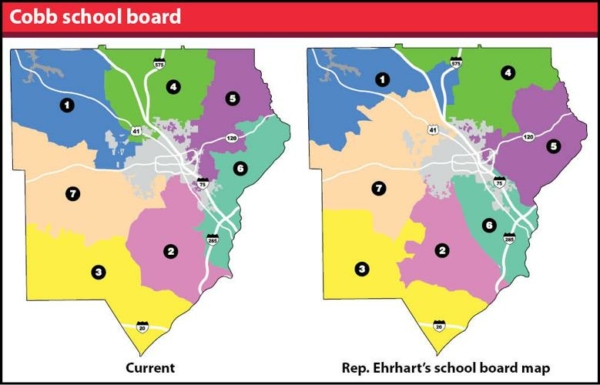ATLANTA, Ga. — A federal court judge on Friday agreed with voting rights groups representing impacted individuals and organizations in Cobb County that a lawsuit challenging the racially discriminatory Cobb County School Board map should continue despite opposition from the Cobb County School District and Board of Elections.
The lawsuit, Finn v. Cobb County Board of Elections, was filed more than a year ago and describes how the school board and Georgia legislators used racial demographic information to “pack” voters of color into three districts (districts 2, 3, and 6) and whitewash the four remaining districts. The use of racial demographic information to diminish the voting power of Black and Latinx communities violates the Fourteenth Amendment of the U.S. Constitution.
The Cobb County Board of Elections moved to dismiss the case because they believed they weren’t the right party to sue. The Cobb County School District, which voluntarily intervened as defendants in the case in January, also sought to have the matter dismissed, including on a theory that, despite their own decision to enter the case, they were not proper defendants in the suit.
District Court Judge Eleanor L. Ross rejected the Board of Elections motion in full, confirming that the plaintiffs pled the case correctly in its initial filing. Judge Ross partially granted the school district’s motion, but only on the grounds that they could not be held liable under a jurisdictional doctrine called Monell. This ruling does not prevent plaintiffs from obtaining their requested relief: to prevent use of the map in future elections. Judge Ross concluded her order by confirming that the lawsuit would continue and that plaintiffs would have an opportunity to prove their case on the merits.
“Despite the district’s mischaracterizations of the court’s order and the case itself, we are pleased that the plaintiffs’ case against the Board of Elections is moving forward,” said Poy Winichakul, attorney for voting rights at the Southern Poverty Law Center. “Judge Ross declined to endorse any of the district’s arguments related to the constitutionality of the school board map. What this means is that our case is proceeding exactly as plaintiffs originally pled it last summer.”
“A major reason not to name the district initially is because of the concerns identified in the court’s order,” said Chris Shenton, counsel for the plaintiffs from Southern Coalition for Social Justice. “When the district intervened in the case despite those concerns, we did not oppose. When they then turned around and asked to be let out, we opposed only to prevent the district’s gamesmanship from derailing the case. We are heartened that the court did not allow the district to do so, and plaintiffs look forward to proving what they have alleged all along: the school board map is an unconstitutional racial gerrymander.”
“Despite the district’s misleading rhetoric, the Court’s order applied longstanding precedent about how plaintiffs must file these types of lawsuits, and confirmed that the plaintiffs here had done so correctly,” said Caitlin May, Voting Rights Attorney from the ACLU of Georgia. We are pleased that the suit is moving forward just as originally pled after the district requested to enter the case and then requested to be dismissed. Plaintiffs intend to continue to seek justice for all students and parents in the Cobb County School District.”
“This decision from Judge Ross is a return to the status quo in our case,” said Sofia Fernandez Gold, counsel for the plaintiffs at the Lawyers’ Committee for Civil Rights Under Law. “The central claim of this lawsuit still stands: the Cobb County School District drew a map that packed Black and Latinx voters into just three districts to dilute their voting power. The Board of Elections & Registration must be enjoined from implementing a map that violates the Fourteenth Amendment. We’ll continue to focus our efforts on proving that claim.”
Cobb County is the third most populous county in Georgia with just over 766,000 people. It is also one of the most rapidly diversifying counties in the state. Between 2010 and 2020, Cobb moved from a majority-white (56%) to a majority-BIPOC county (52%), with the white population dropping at a rate almost double that of the reduction in white population across the state. Accompanying the demographic shift is a clear growth in the political strength of voters of color.
Media Contacts:
SPLC: Ashley Levett, ashley.levett@splc.org, (334) 296-0084
SCSJ: Melissa Boughton, melissa@scsj.org, (830) 481-6901
ACLU of Georgia: Dorrie Toney, media@acluga.org, (404) 302-0128
SRZ Contact: Sara Solfanelli, sara.solfanelli@srz.com, (212) 756-2475
LCCRUL: Lacy Crawford, lcrawford@lawyerscommittee.org, (252) 292-6088

